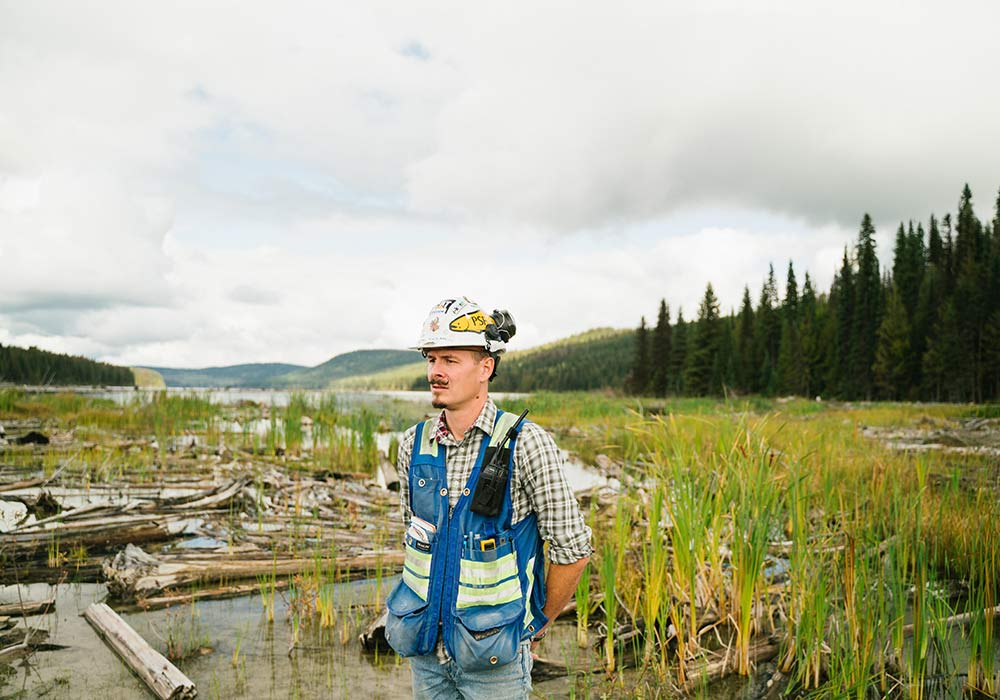Web developer is a growth career as almost every organisation requires an online presence and so needs someone to create high-quality websites and applications.
Your primary task as a web developer will be to use programming languages to create reliable and high-performing websites and web-based applications and services. It’s likely that you’ll work in one of two areas:
- back end: which focuses solely on the underlying software and databases, where you’ll deal with functional aspects
- front end: working on the interface and visual design, focusing on aspects that users interact with.
It’s also possible to combine the two which is known as full-stack development.
You could work in an agency or as a freelancer where your job will be to create products that meet clients’ needs. Alternatively, you may be based in-house working on the website and applications of your employer’s business.
The work can be varied, and you may have several projects running simultaneously. You’ll have regular meetings to update your employer/clients on project progress and to discuss any changes to the requirements.
Job titles can vary according to the focus of the role.

Responsibilities
As a web developer, you’ll need to:
- write code in one or more programming or scripting languages, such as PHP or JavaScript
- plan and prototype new applications
- design the architecture of the components of an application
- decide on the best technologies and languages for the project
- test sites and applications in different browsers and environments
- problem-solve and fix bugs in existing projects
- test new features thoroughly to ensure they perform the correct task in all cases
- run performance benchmarking tests
- review colleagues’ code
- build and test Application Program Interfaces (APIs) for applications to exchange data
- research, incorporate and contribute to open-source projects
- meet designers, developers and project staff for progress updates
- gather requirements from clients and users
- learn and test new technologies, frameworks and languages
- build and maintain databases
- carry out code refactoring and optimisation of existing code
- document code, so other developers can understand and contribute to it
- design information architecture within an application or website.

Salary
- Salaries for junior or entry-level web developers can range from £20,000 to £25,000.
- Mid-level and senior web developers usually earn between £25,000 and £40,000.
- Lead developers typically earn between £40,000 and £65,000, potentially rising to £75,000 or more in London.
Salary also depends on the type of company and its location. For example, salaries are usually higher if you’re working in London and are employed by a large company. However, progression to a senior or lead developer may be faster within a smaller company.
Specialising in newer or more sought-after technologies can lead to higher salaries.
Rates as a contractor will vary depending on your level of experience and location.
Income figures are intended as a guide only.

Working hours
You’ll typically work normal office hours, around 37 to 40 hours a week from Monday to Friday.
However, if you work for an agency, you may be expected to work longer or irregular hours to meet deadlines, or to work on projects for clients in different time zones.

What to expect
- You may work within an office but it’s also common to work remotely from home as the only equipment needed is a good quality computer and internet connection. Companies may advertise for web developers on a completely remote basis.
- The job involves spending hours at a keyboard and demands high levels of concentration. To prevent eye strain, a bad back or other related health problems, regular breaks from the screen are recommended.
- Depending upon your employer, your dress code can be informal, or more business-like for meeting clients.
- Women are currently under-represented in the IT industry but the issue is being addressed by the sector. Organisations such as Code First: Girls, Women in Tech, Rails Girls and GeekGirlMeetup provide communities, vacancies and educational tools for women wanting to work in web development and IT.
- There is a global digital skills shortage which means opportunities are good for developers with the right combination of skills. Keeping your skills up to date is essential for this role.
- Jobs are available across the UK as every business and organisation requires an online presence. Major cities may be able to offer more opportunities.
- A small amount of travel is common in client-focused roles, for meeting clients during a project. There will also usually be opportunities to travel to conferences and workshops.

Qualifications
There is no formal qualification needed to become a web developer in the UK, though some employers prefer applicants to have a technical degree. Relevant subjects include:
- computer science
- digital media development
- software engineering
- web design and development.
Knowledge and experience are usually the most important requirements. A relevant degree can provide you with demonstrable knowledge, particularly the fundamental principles of programming and application design.
It’s sometimes possible to find entry-level positions that don’t require any experience. If you take this route, you’ll be trained on the job in the specific languages and technologies used by the organisation. Starting salaries for these roles are generally lower than other web development positions.
Although employers occasionally look for a postgraduate qualification, this is rare and generally only applies to senior positions.
Search postgraduate courses in web development.
Short university courses on specific topics like developing web applications in PHP and MySQL, and HNDs in more general subjects like computer science can also be helpful for gaining employment, especially if you have relevant experience to go with them.
Private training providers who specialise in programming and web development offer courses online, in a classroom setting, or in one-day or weekend boot camps. All of these can provide the opportunity for you to develop your programming skills.

Skills
You’ll need to have:
- technical knowledge in areas such as client-side components, server-side languages, web application frameworks and database management systems
- experience with version control systems, and a thorough understanding of the architecture of web applications and web security and encryption
- ability to teach yourself new technical skills
- attention to detail and analytical thinking
- a logical approach to problem solving
- the ability to work independently and in mixed teams
- experience of development methodologies (such as Agile and Waterfall)
- the ability to manage a complex range of tasks and meet deadlines
- good communication skills.

Work experience
Having some demonstrable experience of using programming languages to build websites or applications is extremely useful when applying for jobs. Employers will want to see the skills you have and the coding you can do.
There are many ways to get relevant experience. Some degrees include a year in industry or placement, which is a great way to develop web development skills. You can also gain experience through volunteering and building your own sites and applications.
Other ways to build experience include joining a web development or coding society at university, completing an internship, attending ‘hackathons’, conferences and workshops, attending meetups for different programming languages and interest groups, and contributing to open-source software.
You can also become a student member of BCS: The Chartered Institute for IT. This provides access to various resources and helps you to stay up to date with developments in the IT industry. BCS also runs webinars and events to develop your skills and can help to build your professional networks.
If you want to work as a freelancer, it’s important to have a portfolio, and include in it, if you can, some testimonies. Use code repositories such as GitHub and Bitbucket to demonstrate what you can do.
Find out more about the different kinds of work experience and internships that are available.

Employers
Almost all organisations require web development work at some point meaning you can find work with a variety of employers. Options include:
- Web development agencies employ web developers to work across projects for multiple clients that can be from any industry. Projects tend to be varied although some agencies specialise in a particular sector, or have long-standing relationships with a single large client.
- Organisations hiring in-house developers if a company or organisation requires development work on a regular basis, it’s likely they’ll hire their own web developer. While the work may not be as varied it will allow you to specialise in the programme language and applications of that business.
- Working as a freelancer if you want control over the projects you work on, then becoming self-employed or freelance is an option. While your work can be more varied and interesting than being employed by an agency or in-house, it’s also typically more unpredictable and can result in an unsteady income. You’ll be solely responsible for sourcing and completing your work.
Look for job vacancies at:
- BCS: The Chartered Institute for IT – you’ll need membership to be able to access the jobs board
- Bubble Jobs
- Contractor UK – for freelance positions
- CWJobs
- Freelancer – for freelance positions
- Technojobs
- VIQU

Web developer jobs
Software Developer C# Graduate ProgrammePeregrineVarious locations£24,501-£27,000Android Software DeveloperTPPLeedsOver £37,001Graduate Software DeveloperTPPLeedsOver £37,001View all information technology jobs

Professional development
In an agency, or technical organisation, you’ll receive most of your training from more experienced developers. This is especially the case in the early stages of your career.
In small organisations, or as part of non-technical teams, you’ll usually need to dedicate time to independent research and self-led learning. Short university courses are available as well as a variety of courses from private training providers who specialise in programming and web development.
Your continuing professional development (CPD) is important throughout your career as you need to keep up to date with developments in the sector. You can fulfil CPD requirements by attending conferences, workshops, training camps and meet ups. There are events for almost every web development language, framework and technology, and most employers encourage you to attend these.
More formal professional qualifications can be obtained from the BCS: The Chartered Institute for IT, including certifications in:
- agile development
- artificial intelligence (AI)
- information security
- software testing
- solution development
- IT architecture.
Employers may expect you to become professionally certified in any relevant technologies they use. Depending on your career path, you may be offered the opportunity to undertake management, business/systems analysis, and project management training.
You need to stay up to date with the world of web development. Try to test out new advancements and integrate them, if appropriate, into the organisation. Activities that may help to advance your career include:
- learning new programming languages
- helping with other projects and leading on new ones
- training and supervising new staff
- attending client meetings.

Career prospects
You’ll typically have started your career as a junior or entry-level developer and will generally progress to a mid-level or senior developer role after around five years.
As a senior developer, you’ll usually work on more significant projects, be given a greater number of clients and lead client meetings. You may also manage one or two junior developers.
The next step is to lead developer, technical lead or head of development. At this level you’ll usually do less coding work and will manage a team of web developers and contribute to the organisation’s technical strategy and goals.
In non-technical or very small organisations, there may not be distinct grade bands to progress through. However, your knowledge and skill will increase over time and should be rewarded with more responsibility and pay increases.
You could also choose to progress by specialising in a certain sector for your web development work, such as retail or banking. You can also move across into other IT-based roles as many of your skills will be transferable. Find out more about Information Technology careers. Alternatively you could become a trainer or further education lecturer.
Written by AGCAS editors
September 2023
© Copyright AGCAS & Graduate Prospects Ltd · Disclaimer




































